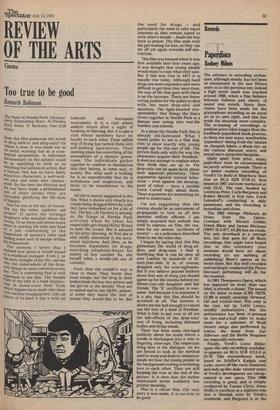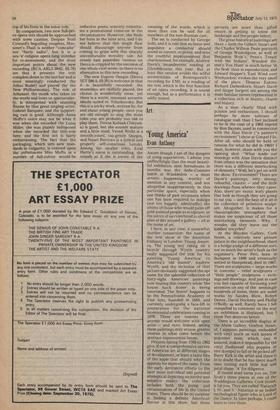Records
Paperdiscs
Rodney Milos
The advance in recording techniques, although steady, has not been so sensational in the last fifteen years as in the previous ten; indeed a high water mark was reached around 1960, when a fine balance between fullness and clarity of sound was struck_ Since then. claims have been made for the gramophone recording as an aural art in its own right, and this has made the situation more complex. The re-issuing of recordings at medium price takes longer than the hardback/paperback book process, so there are now many worthwhile 'paperdisce dating from the 'sixties on cheapish labels; a sharp eye on the various discount stores will reveal more attractive bargains.
Quite apart from price, many paperdiscs must be recommended on purely artisitc grounds_ There is no better modern recording of Verdi's Un Ballo in Maschera than that on RCA SER 5710-12, first issued in 1967 and now marketed at only £5.31. The cast, headed by Leontyne Price, Carlo Bergonzi and Robert Merrill, is first rate, Erich Leinsilorfs conducting is duly passionate, and the recording is immediate and clean.
The 1962 vintage Pecheurs de Perles from the OperaCornique with Nicolai Gedda, Ernest Blanc and Janine Micheau (HMV SLS 877, E4.2)) has no rivals_ The only drawback is a corrupt text, but that goes for all Bizet recordings. One might have hoped that in this centenary year someone would have set about recording (to say nothing of publishing) Bizers operas as he wrote them. But this well recorded and excitingly conducted (by Pierre Dervaux) performing will do for the moment.
In 1961 Threepenny Opera. which has appeared on more than one label, is already a classic. The sound on the latest re-issue (CBS 78279, 0.49) is simply amazing: forward, full and crystal-clear. Not only is the cast, led by Lotte Lenya, notably authoritative, but the performance has been re-pressed on two-and-a-half sides to make room for a selection of Weill theatre songs also performed by Lenya; the items from Der Siibersee and the Berlin Requiem are especially welcome.
Verdi's Luisa Miller, again the only recording available, re-appears on RCA SER 5713-5 at £570. This extraordinary work, based on Schiller's Kabale und Liebe, starts off like early Donizetti and ends up like Aida: twenty years of Verdi's development are encapsulated in one opera. This 1966 recording is good, and is crisply conducted by Faust° Cleva. Anna Moffo is excellent in a soprano role that is fiendish even by Verdi's standards, and Bergonzi is at the top of his form in the tenor role.
By comparison, two new full-price opera sets should be approached with some caution. Despite Noel Coward's beguiling couplets, Massenet's Thai is neither "concale" nor "fairly naiCe", but it is a sex-'n'-religion opera long overdue for re-assessment, and the most important points about the new recording (RCA ARL3 0842, £8.70) are that it presents the text complete down to the last bar and is most winningly conducted (by Julius Rudel) and played (by the New Philharmonia). The role of Athanael, the monk who takes on the world and loses so spectacularly, is interpreted with stunning finesse by that great singing-actor, Gabriel Bacquier, and the supporting cast is good. Although Anna Moffo's voice may not be what it was when she recorded the Luisa Miller, she was plainly indisposed when she recorded the title-role here, and the first act is fairly embarrassing. The fact that the packaging, which sets new standards in vulgarity, is centred upon the unfortunate Miss Moffo in a number of full-colour would-be seductive poses, scarcely constitutes a promotional come-on in the circumstances. However, she finds her form in the later acts, and I do not believe that this single flaw should discourage anyone from coming to grips with this sharply uncomfortable morality tale. An evenly cast paperdisc version on Decca is crippled by the excision of one whole vital scene, so there is no alternative to this new recording.
The new Eugene Onegin (Decca SET 596-8, £9.30) is welcome in that it is beautifully recorded; the ensembles are skilfully placed, the chorus is wonderfully clear, yet there is a warm, resonant acoustic ideally suited to Tchaikovsky. But this is a tricky work, written by, for and about young people; once you are old enough to sing the main roles you are probably too old to play them. Teresa Kubiak (Tatyana) is good, but she sounds mature and a little staid. Vernd Weikl is a smooth-toned, too-gentle Onegin, and Stuart Burrows is a lyrical and properly self-conscious Lenski. Among the smaller roles, Enid Hartle's nurse is outstanding: she sounds as if she is aware of the meaning of the words, which is more than can be said for all members of the non-Russian cast.
The set is conducted by George Solti, and it is odd that so tense and impulsive a conductor should sound so correct, so polite, and miss the youthful impetuousness that characterised, for example, Andrew Davis's incandescent reading at GI,,;ndebourne this year. But at least this version avoids the wilful eccentricities of Rostropovich's recording for EMI: as a reading of the text, which is the first function of an opera recording, it is sound enough, but as a performance it is oddly muted.



































 Previous page
Previous page